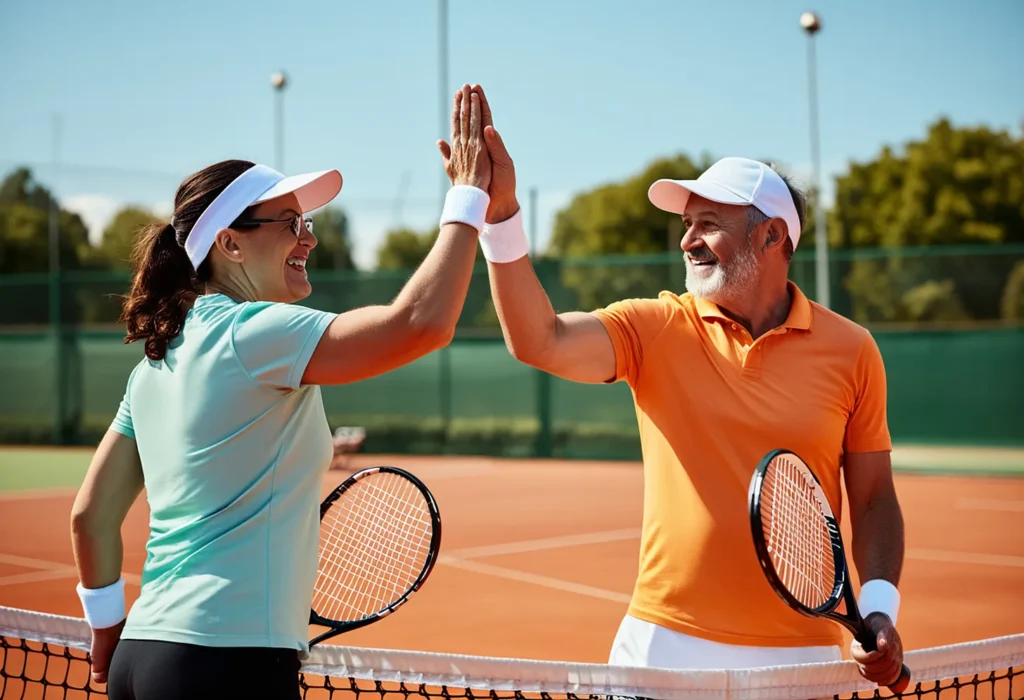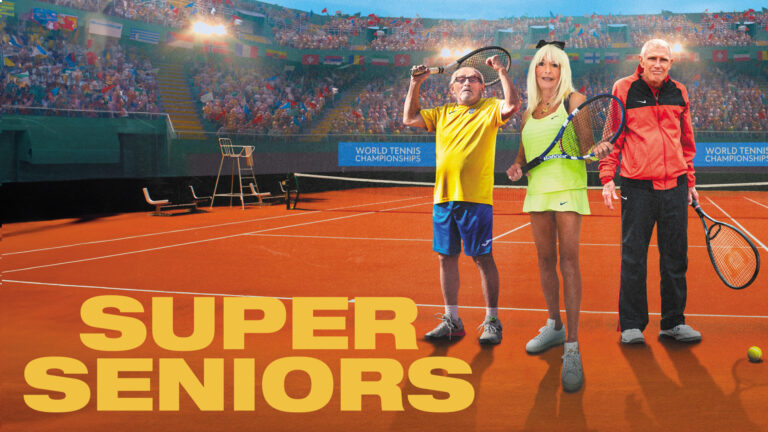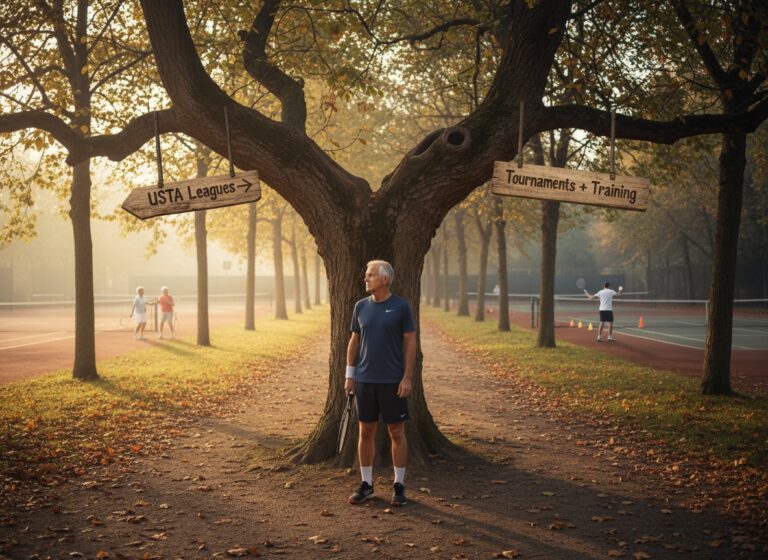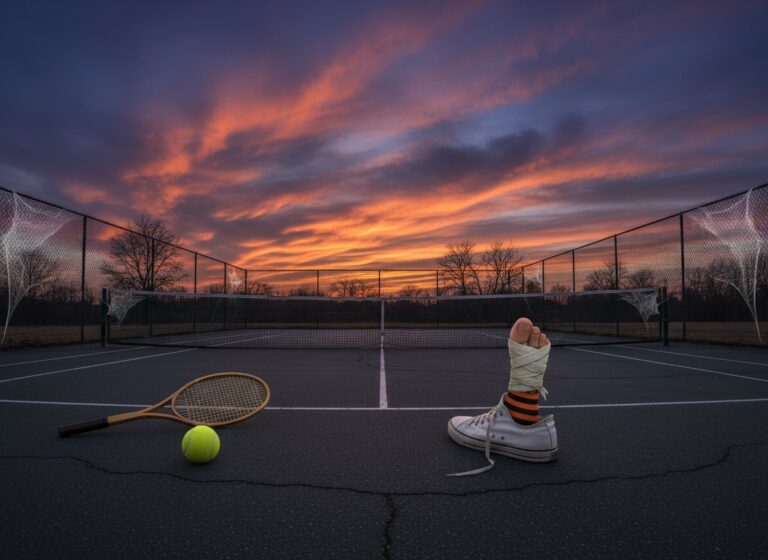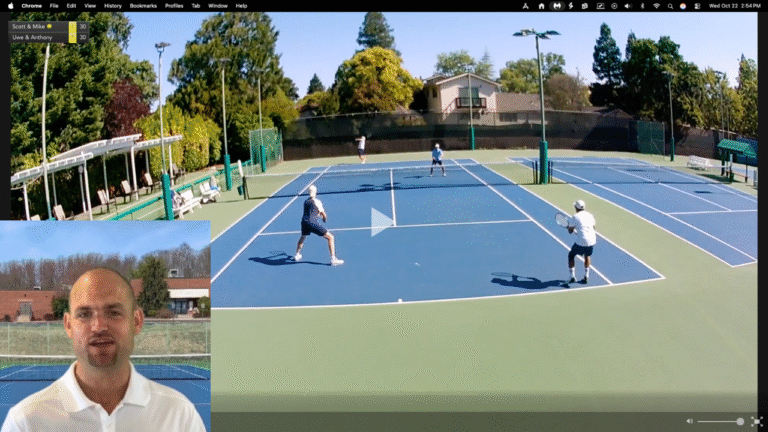When the Stakes Rise and the Nerves Kick In
Most of us like to test ourselves against players who are a little (or a lot) better than we are. I know I do. There’s something fun about measuring your skills and having to push a bit harder to keep up. But there’s always that extra layer of nervousness. Mess up too much, and you worry they’ll never want you back for another match. In singles, there’s less you have to worry about — just play your points, score a few, and hopefully get another invite.
Doubles: Pressure, Partners, and Chemistry
Doubles can turn things up a notch. Suddenly, it’s not just about your game, it’s about your partner, too. That pit in your stomach grows every time you send a shot to the moon—or even when you miss something no one would ever call easy. You start thinking, “What does my partner think of me now?” I always wonder if the better player on my side, maybe higher up the ladder, gets the same thoughts. Do they care when they miss? Probably not. They know even the top players mess up almost half their shots, which kind of puts the whole mess in perspective. Still, feeling like the “weaker link” comes with a special kind of pressure.
I remember once pairing up during a tournament with a 4.5 player. The nerves didn’t have time to fade because every mistake got me a dramatic sigh or an exaggerated shrug from my partner. Not exactly the best way to feel like a team. Even my wife, who can watch tennis with a sharper eye than most, noticed and told me later she felt bad for me. Somewhere during that match, I decided to play for myself, not to impress my partner. I stopped caring about his reactions to my mistakes and just kept my focus. In the end, I hit a couple of net volleys that helped us win. My partner celebrated, I played it cool, but made a mental note not to team up with him again anytime soon.
Flipping the Script: When You’re the Favorite
Sometimes, it flips, and you’re the highest-ranked player. Right now, I’m in a singles flex league. The stats say I’m the top seed in my group. At first, that bummed me out. I wanted gritty, tough matches with plenty of drama to get ready for tournaments. Instead, the numbers barely told a lie. My first four matches were textbook wins: 6-1, 6-0; 6-1, 6-0; 6-1, 6-0; 6-1, 6-2. You almost feel bad about it—almost. There’s a saying that goes, “The toughest match is the one you think you already won.” I kept that in my head and used the chance to strengthen my mental game, even though winning always feels a little easier on the soul.
The Sweet Spot: Playing at Your Level
My favorite matches are with people who play at my level. The outcome isn’t so obvious. You show up with some hope, but no one knows what will happen. You can still walk off the court proud, when bagels are avoided, as long as each set felt close. Nobody likes a blowout, no matter which side you’re on. Scratch that, I don’t mind so much if I’m on the winning side.
Humility Comes for Us All
It’s easy to fall into some bad habits. We all want to win, but not by sticking only with people you know you’ll beat, or ducking out when things get tough. That was me for a while, always picking matches that puffed up my win/loss record instead of making me better. Tennis has a sly way of humbling you. The second you think you’ve got things under control, some 18+ player zips a passing shot at you, or that beginner you agreed to rally with suddenly plays out of their mind. Humility shows up fast, sometimes on a Tuesday night when you least expect it.
The real value comes from mixing it up. One day, you’re hanging in rallies with someone who never misses and you’re sweating buckets just to win a point. The next, you’re the one giving advice or calming nerves after your partner dumps a sitter into the net. Tennis mirrors life that way. Sometimes, you’re the student. Sometimes, you’re the teacher.
Another weird truth: it doesn’t matter how many years you’ve played or how fancy your racquet looks, the jitters never really go away. Even now, when I walk out for a doubles match or hit warm-ups with someone new, there’s that tiny voice worrying I’ll mess up and cost us the game. Spoiler: everyone feels that. The best players just shrug it off quicker.
Singles: Lonelier, but a Mental Playground
Now, about singles: those matches can get lonely. If you go five games without a point, no one is there to joke about it with you or take some pressure off. Stay focused on playing solid points. Try new things against lower-ranked players or carve out some new routines you want to bring to the tougher matches. Singles can be serious business for the head, especially when you’re expected to win. Finding ways to challenge yourself keeps things fresh and fun.
Doubles Done Right
In doubles, chemistry matters as much as ability. I’ve played with friends who couldn’t hit a backhand, and we still found ways to win, just by talking between points and keeping things light. Other times, I’ve partnered with “all-stars” who made the match feel like a job. Attitude on the court changes everything. Shrugs, sighs and eye-rolls break teams quicker than any missed forehand ever could.
The best doubles partners boost each other. Played a bad point? Quick high-five, little joke, move on. Played a good point? Soak it in, then get ready for the next one. Celebrate the wins, shake off the losses.
Why the Close Matches Matter Most
I get more out of the close matches than any “easy win.” Tiebreaks get the heart going. Down a break? Feels like the end of the world until a couple of games swing your way. Win or lose, you remember those matches for a lot longer. Sometimes you play the best tennis of your life but still lose. No shame in that.
Your confidence can take a beating from hard losses, but those are often the matches that help you grow most. You find out what you’re made of, figure out which shots you actually trust, and learn to handle nerves when everything is on the line. It’s all progress.
Your Perfect Practice Mix
So, to keep improving, mix up your court time. Practice with weaker players to work on new skills and find your groove. Play with better players to test your limits and get used to pace you don’t see often. Play close opponents for real competition. That variety keeps you sharp and motivated.
If you’re nervous about playing “up,” remember that everyone started somewhere. Even the best players lost plenty on their way up the rankings. What most people remember is whether you fought for every point and/or acted like a good partner—hopefully not only your win-loss record.
Staying loose, having fun and building good habits matters more than winning every single match. If you make a mess of a shot, laugh it off. If your partner wins the point on guts alone, give that high-five like it’s the finals. The courts aren’t just about hitting winners—they’re about enjoying the game and the people you meet.
The 20-20-60 Rule for Matchmaking
When you’re picking practice matches, especially for singles, remember this tip I got from a coach: play about 20% of your matches against people below your level. It’s great for trying new things and building your confidence. Even top players do this—think of how pros drop into lower tournaments after a break to get back in rhythm.
Next, aim for 20% of your matchups with folks who are stronger than you. Playing better opponents shows you your weak spots in a hurry. Plus, you get used to facing tougher shots and faster rallies, which helps as you move up.
Spend the biggest chunk, about 60%, playing others at a similar skill level. These matches push you while giving you a fair shot to win and learn. The right mix keeps your practice fun and steady, making progress feel doable instead of overwhelming. Give it a try and see how your game grows.
If you’re the better player, remember what it feels like when you were the underdog. Encourage your opponent after the match, don’t sweat the small stuff, and remember that everyone is out there to have a good time.
The Real Win
The real win is coming back again, a bit sharper than yesterday, and still excited to find out what happens next time you grab your racquet. If you can walk off the court smiling, you’re doing it right.
I’d love to hear your stories—whether it’s a time you played way above your comfort zone, had to carry a partner, or found yourself outmatched but still grinning at the end. Share your experiences in the comments and let’s swap lessons from the court.


